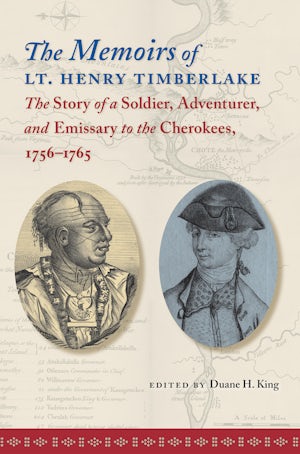The Memoirs of Lt. Henry Timberlake
The Story of a Soldier, Adventurer, and Emissary to the Cherokees, 1756-1765
Edited by Duane H. King

216 pp., 6.125 x 9.25, 24 color plates., 80 halftones, appends., notes, bibl., index
-
Paperback ISBN: 978-0-8078-5827-1
Published: June 2007
Buy this Book
Distributed for the Museum of the Cherokee Indian Press
This first modern edition of Timberlake's Memoirs is abundantly illustrated with portraits, maps, and photographs of historical, archaeological, and reproduced artifacts, bringing a new dimension to Timberlake's rich portrayal. Assembled for an exhibit produced by the Museum of the Cherokee Indian, this collection of period artifacts, artwork, and traditional items made by contemporary Cherokee artists is a stunning representation of the material culture--both native and British--of the French and Indian War period. A detailed introduction and extensive editorial notes help interpret this 250-year-old chronicle for the modern reader, drawing heavily from historical research and archaeological investigations of the last half-century while still including insights offered by Samuel Cole Williams in the original American version published in 1927.
About the Author
Duane H. King is executive director and Thomas Gilcrease Chair of the Gilcrease Museum in Tulsa, Oklahoma.
For more information about Duane H. King, visit
the
Author
Page.
Reviews
"The first reader-friendly edition with maps, photos, and detailed notes."--Charlotte Observer
"This visually rich volume will appeal to historians, anthropologists, and the general reader and should prove useful in secondary and college classrooms."--The Journal of East Tennessee History



